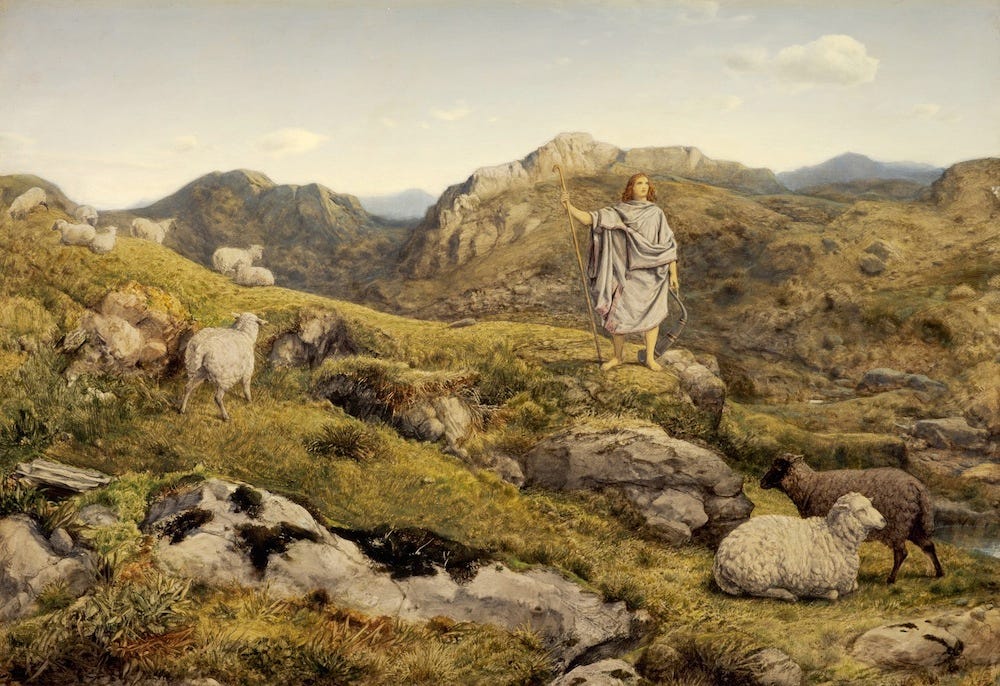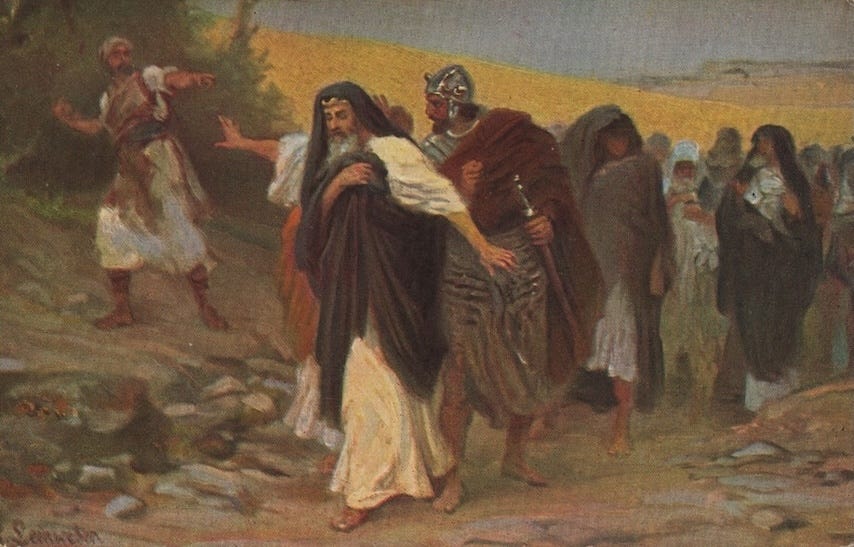Why the Wilderness Transforms You
The real story of King David
The showdown between David and Goliath has inspired artists from Michelangelo to Bernini and filled many a Sunday-school student with dreams of giant-slaying. It is the tale of a young man armed with little more than faith, facing down literal giants to win victory in the name of the Lord.
Yet for all the attention this story receives, little heed is paid to another powerfully symbolic element in the life of King David: the role of the wilderness in his rise and fall.
The first time David flees into the wilderness, he does so as an innocent man escaping the wrath of King Saul. The second time he does so, he himself is the king, and he’s fleeing from his own son. The similarities and differences between these two episodes shed light on the ways in which David’s faith evolved after coming to power, and after the many mistakes he made along the way.
Today, we look at the two occasions in which David is exiled to the wilderness, to see what they reveal about the fragility of faith and power…
Reminder: you can support us and get tons of members-only content for just a few dollars per month:
Full-length articles 2x per week
The entire archive of premium articles and podcasts
We are currently reading Milton’s Paradise Lost in our subscriber book club. The next meeting is TODAY, October 8, at noon ET — don’t miss it!
The Beginning & the End
In many ways, the real story of David’s spiritual growth begins not with Goliath, but with his flight into the wilderness. Hunted by King Saul despite his loyalty to him, David learns to trust in the Lord and wait on God’s timing. When presented with the opportunity to kill Saul, for example, David refuses to, instead saying:
“As the Lord lives, the Lord will strike him, or his day will come to die, or he will go down into battle and perish.”
-1 Samuel 26:10
The wilderness shaped David’s spirit as he prayed, composed psalms, and grew into the man who would one day rule Israel. But years later, when he flees into the wilderness again following his son Absalom’s rebellion, things look quite different.
This time, the wilderness is less a place of testing and growth as it is a place of judgement and repentance. David climbs the Mount of Olives barefoot and weeping, beginning to see how his actions — and his inaction — ushered in sin and destruction to his household.
The same man who once waited patiently for God’s deliverance now faces the consequences of having trusted in his own strength. The same wilderness which had purified and prepared him for kingship still serves its purgative purpose, but this time as a reckoning and atonement for his past mistakes…
Cries of Grief
Both times David emerges from the wilderness, he does so by mourning the death of the man who tried to kill him.
On the first occasion, David executes the man who killed Saul, asking “How is it you were not afraid to put out your hand to destroy the Lord’s anointed? He then tears his clothes and weeps, lamenting:
“Your glory, O Israel, is slain on your high places!
How the mighty have fallen!”
-2 Samuel 1:19
David’s grief was that of a man who still saw God’s hand even in his rival’s life, and who refused to seize victory at the expense of reverence. His humility upon emerging from the wilderness revealed that his faith was rooted in the right things, above all a trust in God’s plan.
Years later, however, when Absalom dies, David’s cry echoes the same anguish — but this time from a different heart:
“O my son Absalom, my son, my son Absalom! Would I had died instead of you, O Absalom, my son, my son!”
-2 Samuel 18:33
The words sound similar, but the meaning has changed. This time, David’s lament isn’t just for the fallen, but for his own brokenness, since it was largely David’s inaction that led to his son’s rebellion. Between these two cries of grief lies the entire arc of David’s kingship — the innocent shepherd who trusted in God’s timing, and the weary ruler who learned too late what power and sin had cost him…
Bookends on the Journey of Faith
The two wildernesses stand like mirrors at either end of David’s life. In the first, he learns that victory comes through faith, whereas in the second he learns that even faith must be renewed through repentance. Both journeys into the wilderness strip away his power, pride, and comfort until nothing remains but David’s dependence on God.
As a young man, David trusted completely in divine providence, declaring before Goliath that “the battle is the Lord’s.” In his later years, however, that trust falters. David begins to rely on numbers, for example by ordering a census of his available soldiers. The same man who once waited for God’s timing now measures his strength in men and arms.
Yet through his downfall, the pattern of grace continues. David’s life unfolds in a cycle of faith, power, sin, and repentance, with the wilderness serving as a catalyst for the most painful — yet most necessary — changes. It is a place of both purification and redemption, a liminal space in which the “man after [God’s] own heart” learns that leadership without humility is hollow, and that even kings must bow before the justice of God.






Beautiful article, thank you for writing it.
"The two wildernesses stand like mirrors at either end of David’s life. In the first, he learns that victory comes through faith, whereas in the second he learns that even faith must be renewed through repentance. Both journeys into the wilderness strip away his power, pride, and comfort until nothing remains but David’s dependence on God."
Spot on.
This was so insightful and very conforting to realize that wilderness seasons may look different but each one is to bring us closer to the lord